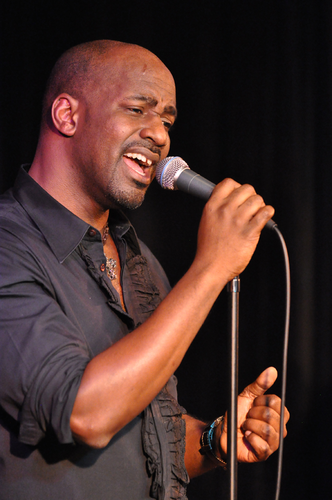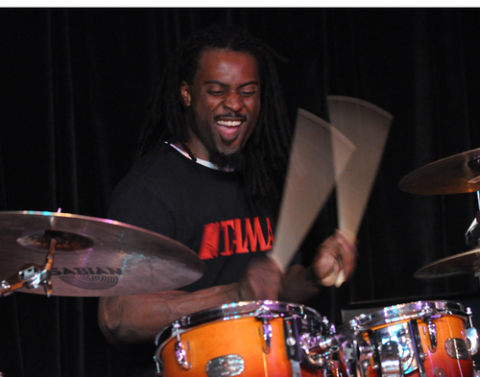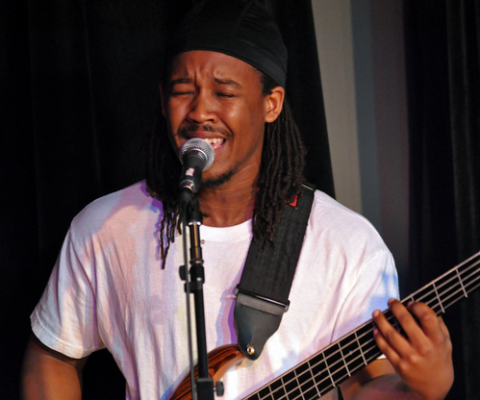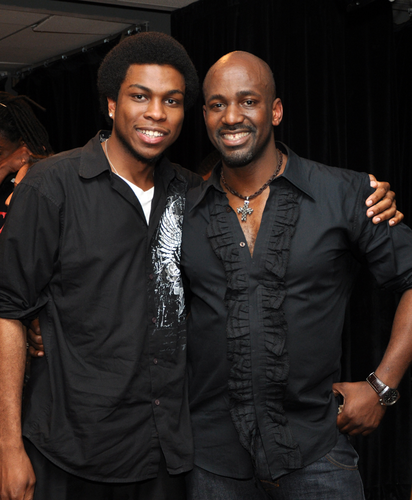Gordon Chambers: When Preparation Met Opportunity



Chambers's band is made up largely of Berklee alumni, such as drummer Les Cleveland '05.
Photo by Phil Farnsworth

Louis Cato '04
Photo by Phil Farnsworth

Chambers duets with Darcel Wilson, Berklee faculty member.
Photo by Phil Farnsworth

Student Jonathan Lewis with Chambers, who spent part of his visit meeting one-on-one with aspiring Berklee songwriters.
Photo by Phil Farnsworth
Arts journalists often face the assumption that they failed as artists. Gordon Chambers breaks that myth wide open. While he was the entertainment editor at Essence, he spent his nights writing songs—and won a Grammy doing it.
As an ASCAP visiting artist April 8–9, Chambers talked to songwriting classes, consulted with students on individual tracks, and performed with his band. After years of working with Berklee grads (including several of his current bandmates), "I jumped at the opportunity to see what it's all about," he said.
Though Chambers didn't study at the college, his blend of business savvy and creativity echoed the Berklee's mission. At Jon Aldrich's Business of Songwriting class, Chambers told the story of his big break—an event heavily dependent on the magic of Federal Express. It started at a mid-week songwriting session with his colleague Barry Eastmond, who was working on Anita Baker's album and had some leftover ideas called "I Apologize."
"Barry gave me the skeletal track at 2 a.m. I drove home from his house and the song wrote itself. I called him at 2:45 in the morning and woke him and his wife up," Chambers said. Having learned from past experience, Chambers knew to get his name on the songwriting credits there and then. In the next few days, he and Eastmond recorded the demo, got it to Baker, recorded the song with her, mastered it, sent it to the record company, and got it on the air. Barely a week after its genesis, "I Apologize" hit the charts. Baker won a Grammy for the track.
"It truly was like a fairytale," Chambers said—and he knew how to build off it, signing a big deal with star producer L.A. Reid's new Hitco Music Publishing company and writing songs for all the great r&b singers: Aretha Franklin, the Isley Brothers, Patti LaBelle. A decade later he branched away and started a new path as a singer, running his own career and discovering a whole new set of creative and business tools.
Chambers's experiences impressed student singer/songwriter Panagiotis Koufogiannis. The lesson he drew was that "In order for me to succeed I should be in the right time with the right people," he said. Manasseh Israel, a songwriting major, thought it was "really cool to see someone hustling with their music in the industry," exhausting every resource. "He's working at it because he loves music."
Here's more of Chambers's advice and stories.
On discovering music
My parents are good people. I'm Jamaican, and Jamaican people love to get together. My father bought about 10 albums every Friday. They would have listening parties. My favorite was Gladys Knight. I grew up being present to people enjoying music. I wanted to be part of the joy.
On becoming a singer
In 2004, Whitney [Houston] looked me in the eye and said "It's time for you to start singing." I was very afraid. There's two emotions in life. There's either love or fear. And the love kicked in over the fear. I had to borrow against my house [to finance the record]. Now my life is very different. I still do some writing but I do a lot of performances. You've got to keep on changing. Change, rebrand, and find a new way to keep doing it. I want to do music for the rest of my life.
On a high-profile gig
I performed for Obama. He said, "Those were stunning renditions."
On divvying up the songwriting credits
Everyone in the business gets messed over. You don't want to have that experience twice. But a smaller portion of a big thing is better than a bigger portion of a small thing. I still make a living from songwriting royalties. I have over 100 songs playing all over the world. I'm amazed, when I actually read the royalty statements, where the airplay is.
Now I'm independent completely, but I've had two publishing deals. When I left Hitco my deal was still on recoup. I was there for 10 years—it was a lot of money. I bought a beautiful house. But [L.A. Reid] was branding Hitco through signing me. It's always branding.
On making money in the new music economy
I make money from gigging—I do a lot of gigs. Speaking engagements. Sometimes I do jingles. One year I made $60,000 from singing a Burger King jingle! I also own some properties. When you make money, please buy property and have some rental income.
I do not have a booking agent. You start small, you market the hell out of yourself on all the social networking sites, build buzz—are you guys coming to see me tomorrow?
I'm on Pandora, I'm on Sirius, XM. I found out there were these royalties due me. I got like $3,500 from [digital rights organization] SoundExchange! It was very reaffirming. It made me feel like a real artist.
